I press record. “Just by doing this interview,” I say, “to a certain degree you’re really putting a target on your back.”
It’s important Matt Bloch understands this before we proceed, especially after the recent video game bar arrests in Japan.
“Yeah, that’s my main concern, and I’m wondering if there’s an upside to it – like, drawing attention to it,” Bloch says. “It’s at my own peril, I understand that. But I want to have this interview. Hopefully, it won’t come back to bite me in the arse.”
Bloch, the owner of a video game bar in Osaka, Japan called Space Station, is sitting across from me at a nearby chicken wing restaurant called Sauce Boss in Osaka’s “Ame-mura” – that is, “America town”.
The district got its name in the 1960s for its plethora of Hawaiian shirt vendors. These days, the flower-patterned threads are long gone, replaced with hip, fashionable shops in a sort of simulacrum of the West.
This is the youth district where I burnt through my early 20s in clubs, bars and CD shops. It’s also where you go to find real American wings – not the subtle flavours of grilled Japanese tebayaki but big, breaded, deep-fried chicken parts doused in Buffalo or Bourbon BBQ.
Everyone in Sauce Boss seems to be a foreigner, and the waitress speaks perfect English. For a moment, I forget I’m in Japan.
“Osaka City has the densest cluster of video game bars in the world,” says Bloch, ordering a vodka soda with lime. “The scene is bigger than in Tokyo. It’s a gaming mecca.”
I’m trying to remember how I know Matt Bloch. He’s always just kind of been around, at game events such as BitSummit or Tokyo Game Show. Now in his early 40s, he’s been in Japan since 2006.
I do remember one year he was at the Tokyo Game Show in cosplay. Matt’s a wiry guy, and he made an excellent Luigi. But until tonight, I’d never been to his bar.
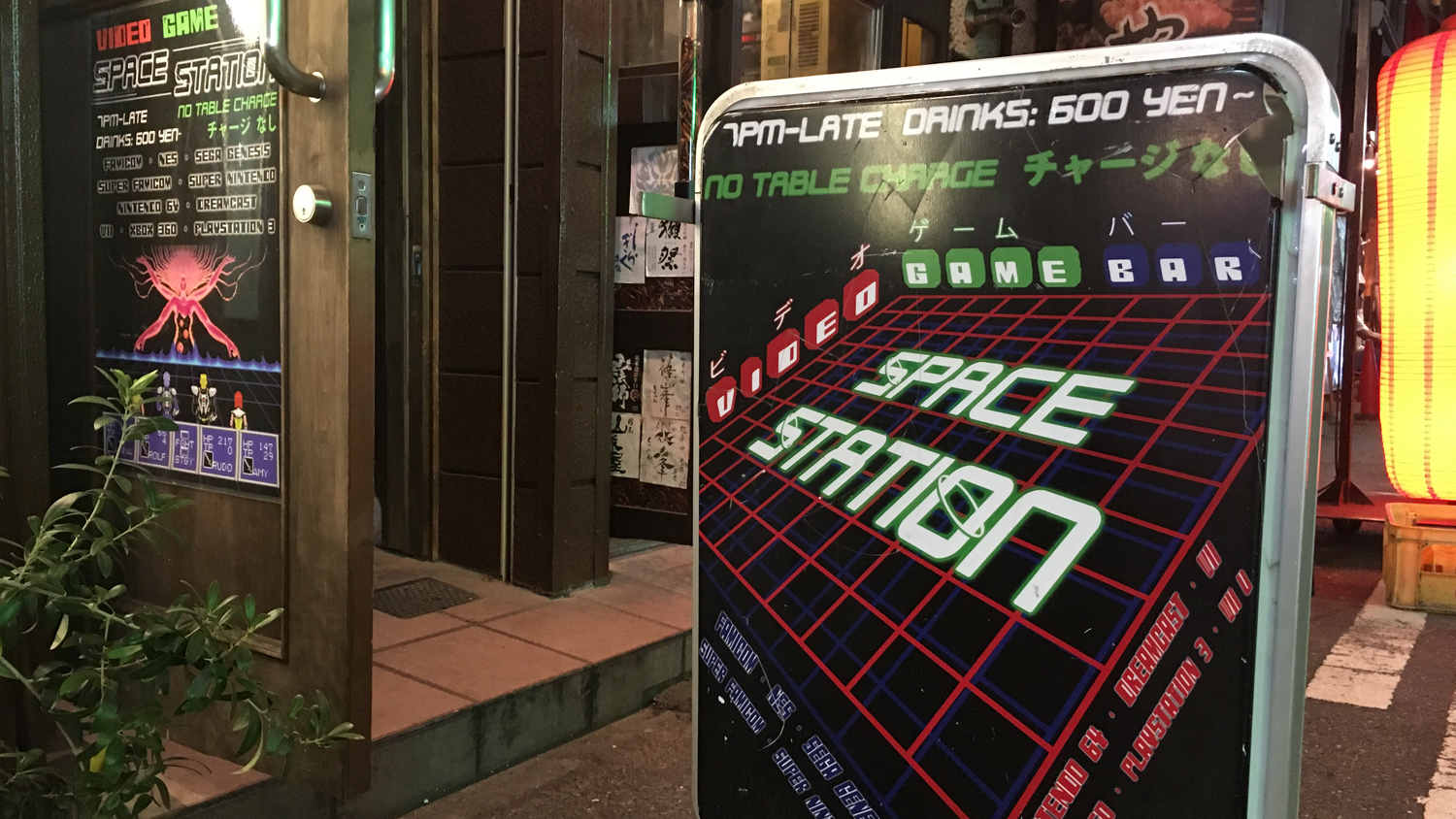
Bright signs on the street advertise the “video game bar”, Space Station. Photo: Brian Ashcraft (Kotaku)
The “video game bar”, a small drinking establishment that’s decorated with video game memorabilia and usually full of games and consoles for the patrons to play, has become quite popular in Japan over the last decade.
Japan’s liquor laws are fairly lax in this regard, making it quite easy for would-be bartenders to open up shop, leading to a staggering number of tiny bars scattered around the country.
One of the oldest, called 16Shots, opened in Tokyo in 2006; another called A-Button, the first of its kind in Tokyo’s geek district of Akihabara, followed in 2007.
The mid-2000s were when kids who grew up with the Nintendo Famicom were becoming old enough to drink, and game bars were more than a place where friends and co-workers could meet to down cold Kirins and Suntory highballs.
They also served shots of nostalgia, served neat, letting their patrons re-live childhood memories in a grown-up setting.
Bloch’s bar Space Station wasn’t the first video game bar in Osaka – that honour goes to Game Bar Continue, which opened in 2008. Space Station, however, was the city’s third video game bar when it opened on 26 April 2011. That was before competitors started popping up like mushrooms all over Shinsaibashi.
Bloch said he stopped keeping track after the number of video game bars reached two dozen. That was two years ago. Things are different now.
Space Station, like Sauce Boss, is popular with expats and tourists. It has a high TripAdvisor ranking and a load of positive Google reviews.
“Every year is better than the previous,” Bloch says of the bar’s fortunes.
But he doesn’t know how long that trend will continue, given recent events.
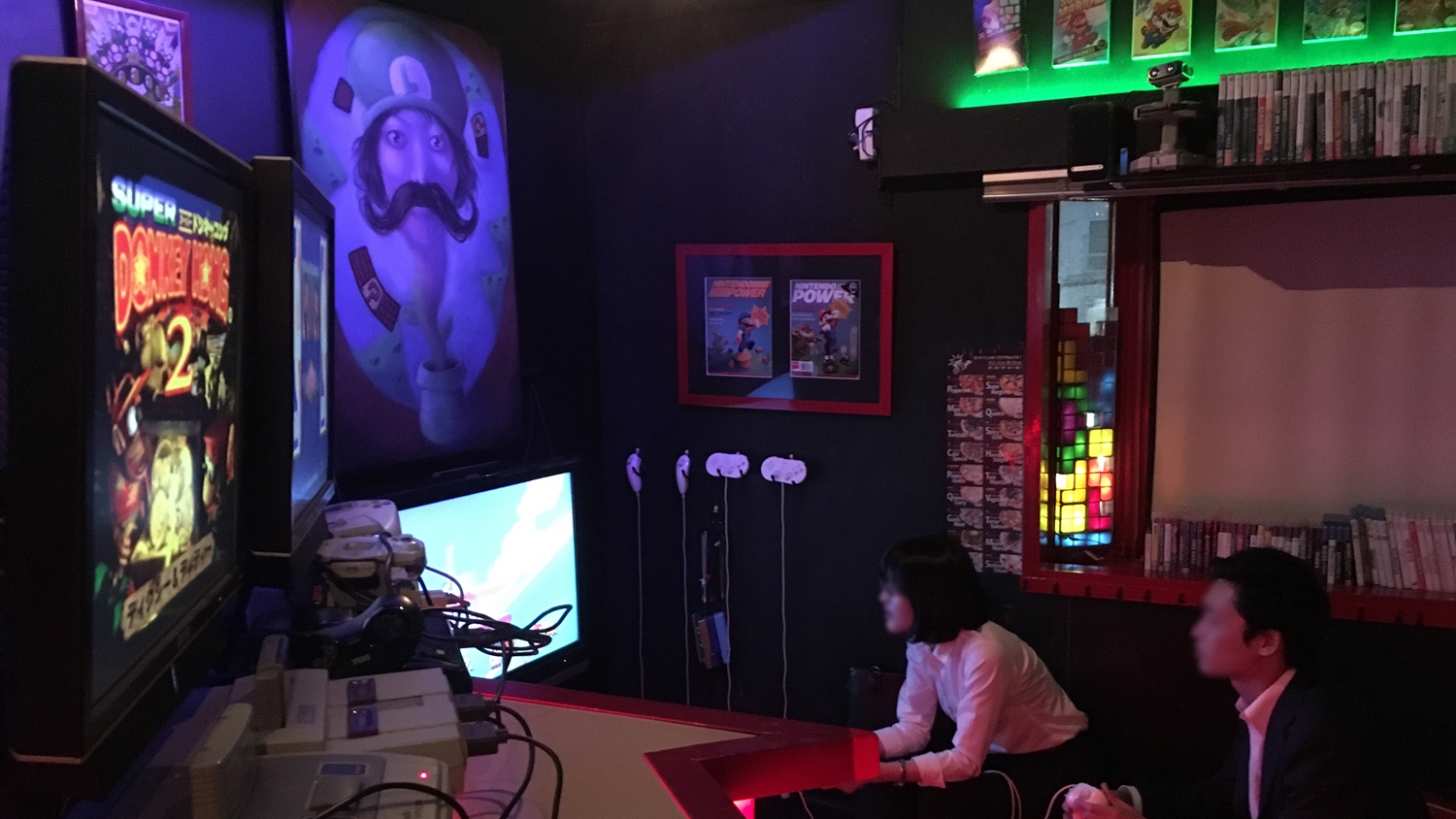
Two customers play a video game at Space Station. Photo: Brian Ashcraft (Kotaku)
Osaka’s gaming scene was turned upside down over a week ago when there were multiple arrests at video game bars in neighbouring prefectures.
Two owners were arrested in Kyoto and two more were arrested in Hyogo, charged with violating the Japanese Copyright Act – specifically, the game publishers’ jouei-ken (上映権), or screening rights.
By showing the games in a public setting, the bars were breaking the law.
Bloch was in his Osaka apartment, meditating, when he got a Facebook message from a friend letting him know about the arrests. What he saw shocked him, and he started to rationalise that it wouldn’t happen to him.
“I started thinking all sorts of things to maintain a sense of security, even if it was a false sense,” he said.
He wanted to believe that it was only the chain bars, which stand out with flashy promotions, that were being targeted. If Japan’s Association of Copyright for Computer Software was just going after the big companies, smaller operations such as Space Station could continue to fly under the radar.
Or so Bloch thought. But as he learned more about which bars were cracked down on, his hopes turned to fears.
“I was hoping that those four bars were run by the same company, but that sense of security was removed from me when I found out that, no, the two in Kyoto are independent of each other, and they’re both bigger than Space Station, but not by much.”
The two in Kobe were a chain, so that threw out any pattern that seemed to be emerging. “I feel less secure because of that.”
To be honest, I told Bloch, I was shocked when I saw those video game bar owners were arrested.
“So was I,” he said. “We all were. It was unprecedented.”
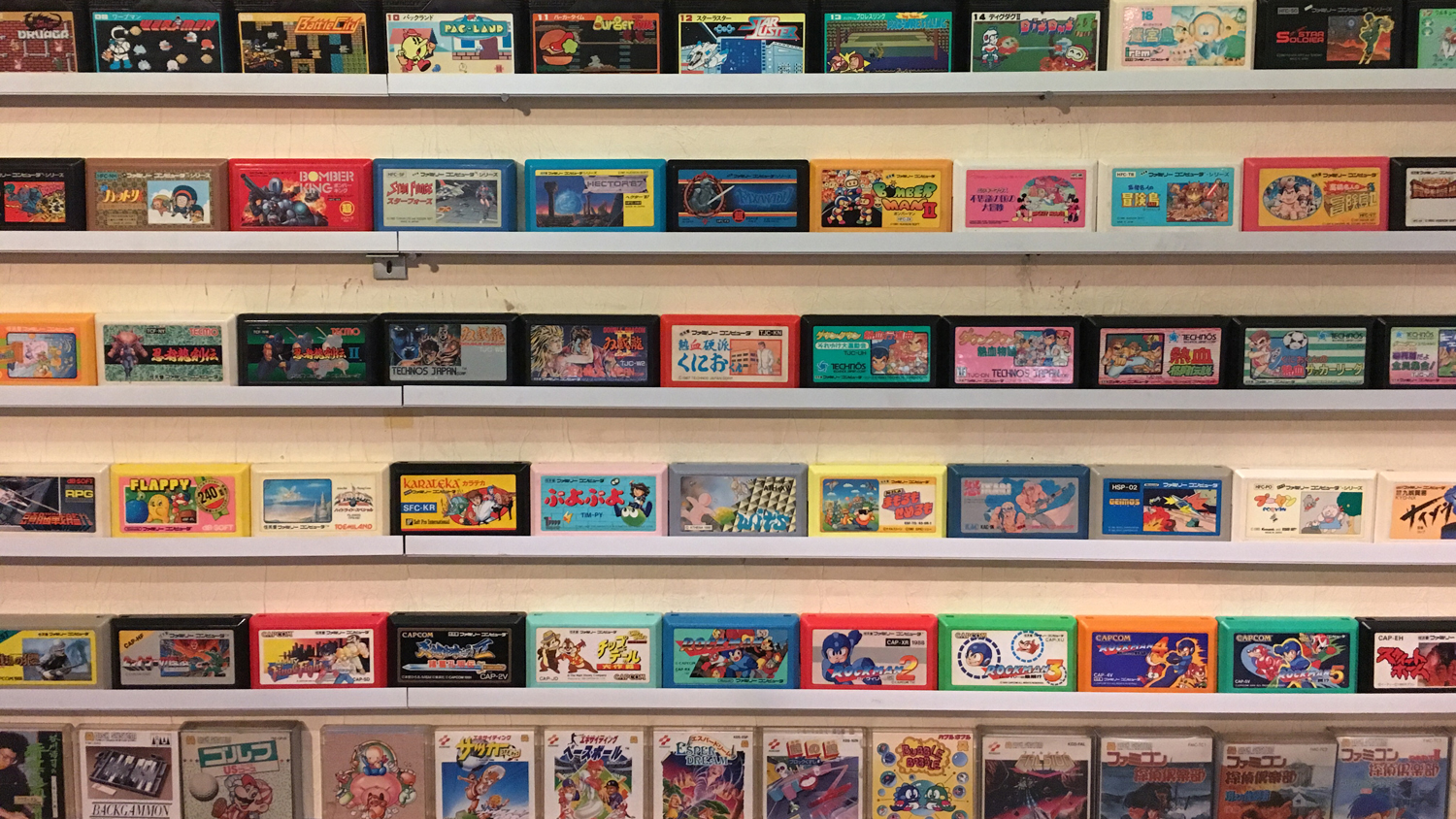
A wall of Famicom games on display at the video game bar Continue, in Osaka. Photo: Brian Ashcraft (Kotaku)
According to a post on the Association of Copyright for Computer Software’s website, the game bars’ crime was letting customers play home video game consoles in their establishments without getting consent from the game publishers.
Since 2011, the ACCS has been sending warning letters to video game bars to end the practice. This year, the organisation and game publishers released a joint statement reiterating their desire to stop these places from offering playable consoles.
Importantly, the ACCS’s action and the subsequent arrests didn’t specifically reference the old games, such as Famicom cartridges, that fill up many games bars. Instead, the complaints centred around hot new games.
The post on the ACCS’s website calls out Mario Kart 8 Deluxe, Monster Hunter: World and Splatoon 2 among just a few others, and is jointly signed by Nintendo, Sony, Sega, Konami, Bandai Namco and Capcom.
One location in Kyoto had over 900 games, while the raid game bar in Kyoto had 200 games confiscated. The two in Hyogo had around 100 games each.
The arrests might have been unprecedented, but this crackdown isn’t a first.
“You may know of Famicom City, which closed in 2011,” Matt says.
“Just a few weeks before I opened Space Station, Famicom City was shutdown in Shibuya by the ACCS. The owners were not arrested. The speculation was that they had a name like Famicom City, so of course, they’re going to made an example of.” In that case, the name itself was referencing a Nintendo product.
“I’ve been on edge ever since.”
In the wake of the Famicom City shutdown, many game bars in Tokyo stopped offering gameplay. There is now a sign at 16Shots that reads, in Japanese and English, “We have no games to play. If you want to play games, please try another store.”
Bloch said that he and other Osaka game bar owners had been talking about possible fixes, such as creating a game bar association to negotiate directly with the game companies and lobby for the creation of a licence.
As he finished off his vodka soda, Bloch said he would have no problem giving up 10 per cent of his earnings to pay for a licence and be free and clear. “I’m just throwing out a figure,” he added.
If the ACCS sends people knocking on his door, though, he said he’d just shut Space Station down immediately.
That seems drastic, I replied. Why not just take out all the games and put in arcade games, which are licensed for public use?
“Good question. I’m thinking of all kinds of things now. All the bars are. Continue took the most drastic measure I’ve seen. They took all their monitors away,” he said.
Other bars are turning off their monitors when the consoles aren’t in use, or changing the name of their establishments from “game bar” to simply “bar”.
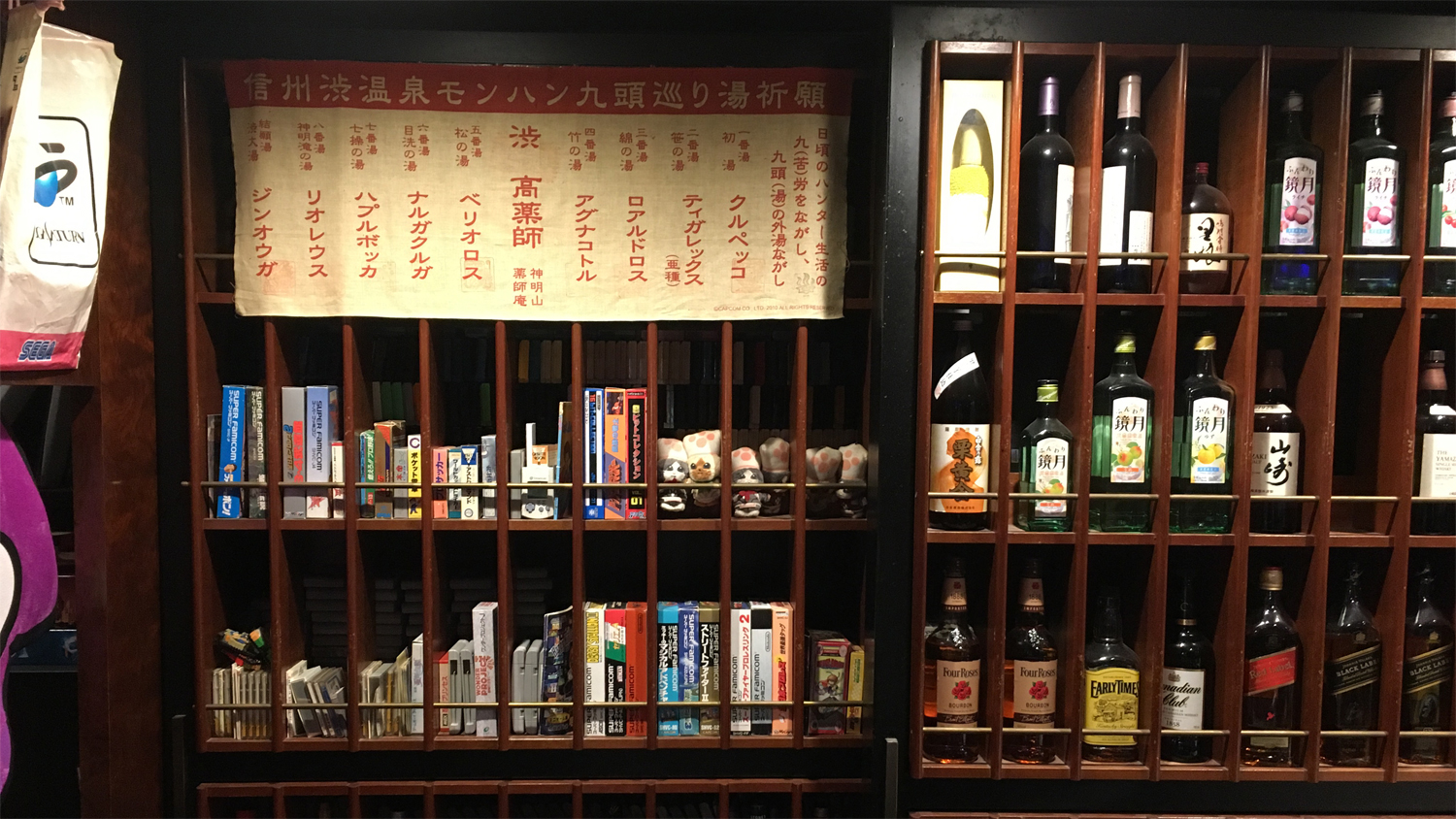
Classic video games share shelf space with bottles of liquor at Continue. Photo: Brian Ashcraft (Kotaku)
Another possible solution: When I ask Matt which games he recommends the most to customers, they are indie games. Limbo for solo customers, Ibb and Obb for couples on dates, Overcooked for larger groups. They’re all indie games. Surely he could get the copyright owners to sign off.
As we finish our drinks, Bloch says he needs to get a couple of bottles of Captain Morgan, so I accompany him to a nearby “super cheap” liquor store before we head over to his bar.
I’ve never been to Space Station, so I ask Matt if I can see him set up. He flips on all the switches, the lights, monitors and consoles coming to life. It’s still a darkly-lit place, even with the glow of the monitors.
At the bar, where it’s standing-room only, hot pink illuminates the counter, and purple and green hues accent the walls and ceiling.
Memories of the 1980s and my local arcade comes flooding back. All that is missing is cheap carpet and the smell of cigarettes, both lacking at the smoke-free Space Station.
I can see now that this place isn’t large enough for arcade machines. American “barcades”, which have become popular on generally the same timeline of Japan’s game bars, have no such legal issues, since arcade games are by their nature licensed for public play.
But in Space Station, and most of the other cramped Japanese bars that can only seat a tiny number of patrons at a time, there’s no space for massive arcade cabinets.
Bloch shelves the bottles of Captain Morgan and does a quick inventory. It’s 7:01PM. Space Station is open for business.
As customers start to stream in, I scan behind the bar and quickly assess that Bloch’s selection of Japanese whisky could be better. I make some suggestions. The rest of the spirits and brews seem OK, but people are clearly not coming here to drink rare or expensive alcohol.
But are they only coming here to place old console games? I have to wonder if Matt is selling Space Station short.
“I just went to Continue, and it was dead,” says a customer named Jonas. He’s in IT, has been here in Japan for three months, and says he’ll probably end up working in Tokyo. “I wanted to come here while I still could.”
That’s a rather macabre thing to say, I think, before asking Jonas if he would come to Space Station if it didn’t have any console games and was just packed with indie games.
“Definitely,” he says as he orders a Baileys with milk, on ice. “I’m not just coming here for the games, because I have all these games at home. I’m here to communicate with others who also like video games.”
That’s the point of this bar. I think about all the bars I like, and while an impressive line-up of spirits might get me in the door, I often come back because I like the people who run the place, the atmosphere they have created, and the other people who frequent the place.
More customers are starting to file in. The place is starting to get packed, so I excuse myself, thanking Matt for making time for the interview.
“Go see my friend’s place, Encount,” Matt says when I head out.
It’s still early when I leave Space Station that night, but it’s Friday. The streets are packed and the weather is perfect for going out. Next week, the disgustingly hot Osaka summer will set in. Let’s enjoy these last few cool evenings.
Encount is up the street, down a gloomy back corridor. It’s around eight o’clock, so the bar should be open.
It isn’t. Odd.
Instead, I head over to Continue, Osaka’s oldest game bar, the one Jonas just called “dead”.
The sign out front lists it as a “cafe bar”, making no mention of video games. But the Famicom heartbeat motif and retro RPG-style font clues in the rest. Ditto for the 8-bit Mario and yellow, question-marked boxes surrounding the 5th-floor elevator button. I’ve found the place.
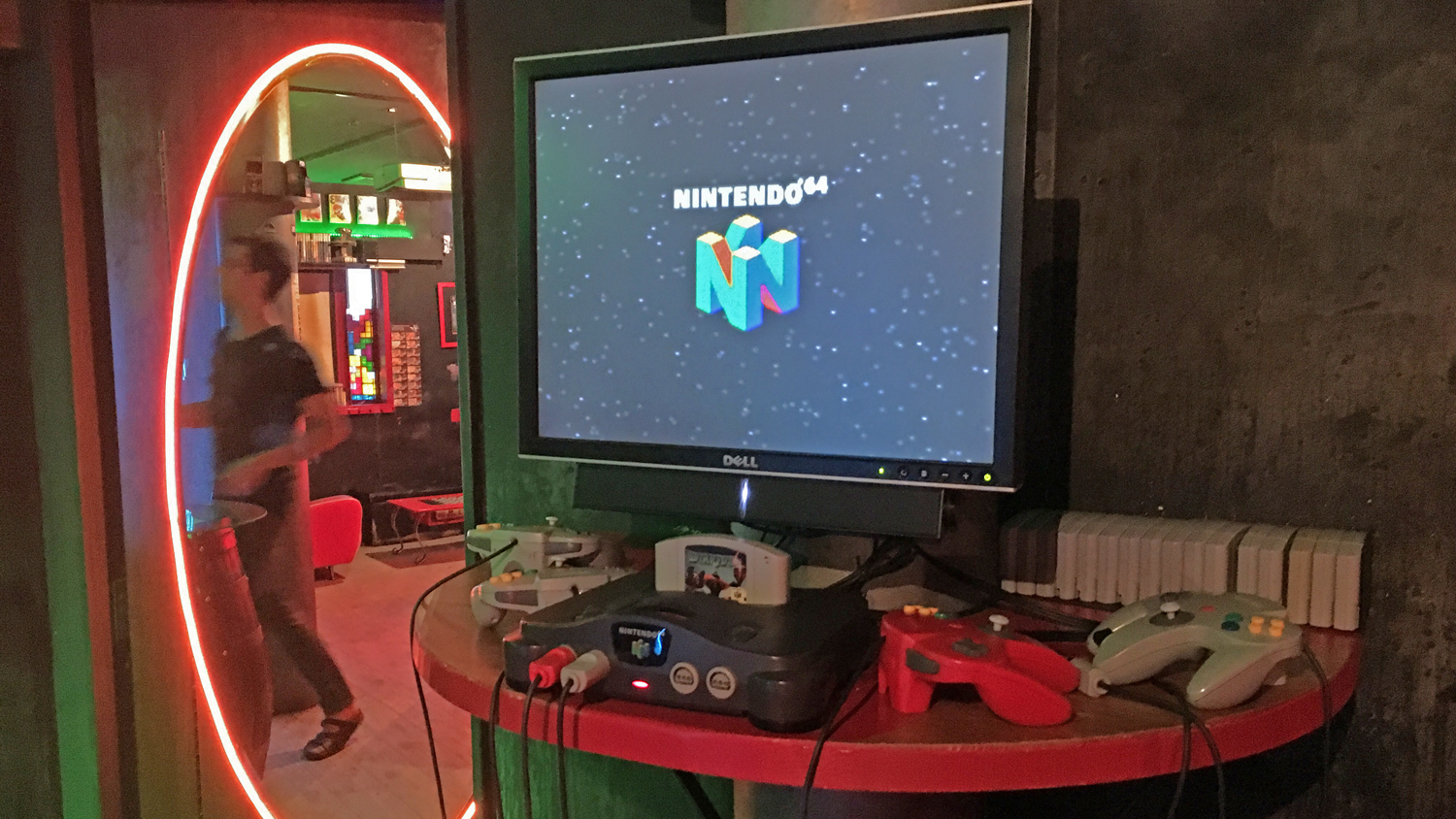
A Nintendo 64 console at Space Station. Photo: Brian Ashcraft (Kotaku)
“Table for one?” I’m asked in Japanese as I step off the elevator. The bar is quiet. I don’t think any game-related background music is playing, as it usually is in these haunts. At least, I can’t hear it.
I look at the bar. All the monitors and consoles have been removed, leaving telltale holes in the clutter.
There are three customers: Two are on a date, it seems, and the third is not and has his nose buried deep in a Dragon Quest 11 strategy guide. The other two talk about their favourite GameCube games. If you cannot play games, you might as well read or talk about them.
I ask the bartender if he’s willing to talk to me about the recent arrests. He seems like an affable guy and agrees, but just wants to make it clear that he doesn’t own the bar and can only give his personal opinion on the matter. “I can’t speak for the bar,” he says. Roger that.
“I knew this day was going to come,” he said, once we established the terms of the conversation. “As soon as we heard about the arrests, we immediately removed all the monitors.”
“Why did you remove the monitors?” I ask.
“That has to do with the screening rights,” he replies, using that phrase jouei-ken again. “The bar didn’t have permission to show these games.”
I think about all the bars and restaurants that show sporting events on TV, free of the concerns that these establishments face. I look over to the stack of board games. “But those are legal, right?”
“Correct. People can legally play board games in this bar.”
It’s legal to have video games and consoles in a bar as decoration, the bartender says. But the second they are fired up, Japanese copyright law is broken.
If the police showed up right now, he continues, there would be no issue. This is a video game-themed bar, not a video game bar.
“Some customers have left as soon as they saw they couldn’t play games,” he said.
“Do you think Japanese copyright law is too strict? These kind of bars are sprouting up all over America,” I note.
“This bar has made it nine years as a video game bar,” the bartender says. “So who knows what might happen in nine years in the United States?”
I feel like I’m disturbing the other three customers. With no consoles to play, talking to the bartender about video games is the evening’s entertainment. I don’t want to ruin that. I take my leave of Continue and head home.
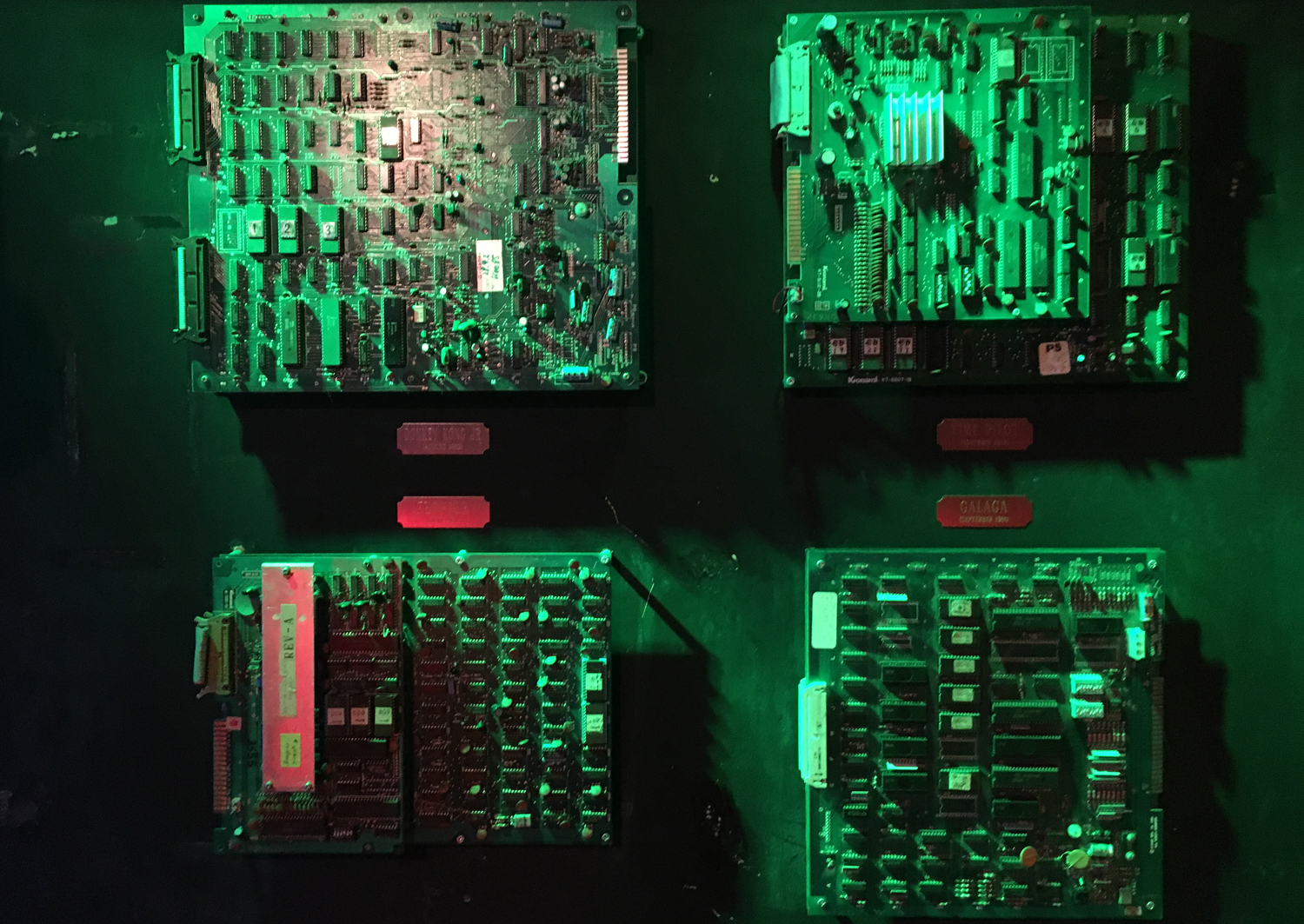
Circuit boards from arcade games like Donkey Kong Jr and Galaga are displayed on the wall at Space Station. Photo: Brian Ashcraft (Kotaku)
The next morning, I awake to read a note posted by Matt Bloch on Facebook.
“It is with abject horror that we are closing Space Station for an indeterminate length of time while the bar undergoes restructuring,” it read. “This decision comes in the wake of news concerning the arrests of individuals and the closure of video game bars in the region over issues of copyright infringement.”
“Apologies for the inconvenience, especially to those who made the bar part of their travel plans.”
I shoot him an instant message. For now, Matt says he’s only taking out the newer consoles, everything from the original Wii to the present, and leaving the old stuff. But if he’s told to remove the other consoles, he will, he said. When he re-opens, the rest of what he’ll be offering are PC games.
I try to pin down Bloch, asking him what his next move is. I get the feeling he doesn’t quite know. Or maybe he doesn’t quite want to say.
“One can play it completely safe, as you suggested, or play probabilities, even in a case where you’re dealing with so many unknowns that you can’t calculate probabilities,” he messages me. “Japan is where I want to be, but not without that bar.”
I am reminded of something Bloch said the other night, about how he’d feel if the copyright authorities close in.
“I’d be so glad it was after I’d had the place opened for eight years,” he said. “It would have been a good run.”
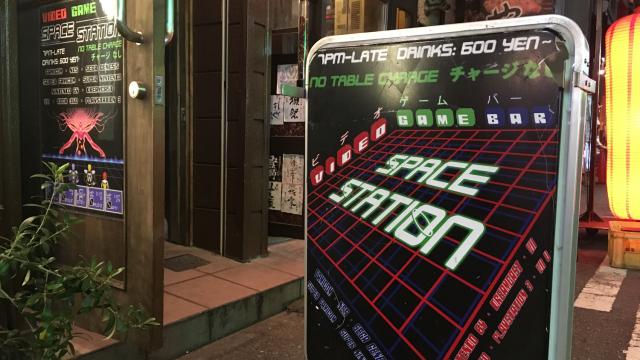
Comments
10 responses to “Japan’s Video Game Bars Are In Danger”
Great read
Great read, but Brian just couldn’t help himself.
Shamelessly plugging his own work at every opportunity. He’s proud of what he’s done, and rightly so. But this is just getting tacky.
Hahahaha I must have skipped that part. Nice pick up. Classic Brian
A great but terrifying read at the same time, that place is one of my favourite haunts when I’m in Japan for chiptune concerts.
It’s sad that the government/industry is cracking down on a potential moneyspinner and putting the people they’re trying sell products to offside.
I have been intending to visit this place for years. I’ll be so angry with myself if it’s closed by the time I finally get to Osaka again.
I’ve been to Osaka plenty of times and had no idea these places existed, I’m gutted.
I wonder how the fighting game tournaments work around jouei-ken.
Only tangentially related, but I hear anecdotally that Japanese screening rights are behind SBS Pop Asia’s totally transparent bias towards K-Pop videos.
There could be some loophole for events and eSports, but I’d assume that because game bars are closer to game rental and eSports are closer to advertising one is pursued more aggressively than the other. I mean the whole fight centres around the idea that rental allows players to circumvent the license on a game. Tournaments sort of do a soft license check by requiring participants to have a skill level that only comes with buying the game or playing it in an arcade.
From what I understand of the jouei-ken, Article 22-2 of the Copyright Act (translated) states that:
Article 26-3 (translated) states:
Put together, it means that it is illegal to either rent games to patrons of a bar, or permit games to be played in what is deemed to be a ‘public’ place.
‘Public’ (koushuu) means (generally) 社会一般の人々(people of the society in general) or, for the purposes of the Copyright Act – ‘a large number of specified persons’.
In other words, pretty much anyone is screwed unless the games are played in private and aren’t rented. Even if you had the screens in private booths, I wouldn’t take my chances, as the argument would be that the booths are accessible by the public.
Japan definitely has a “cut off your nose to spite your face” approach to copyright enforcement.